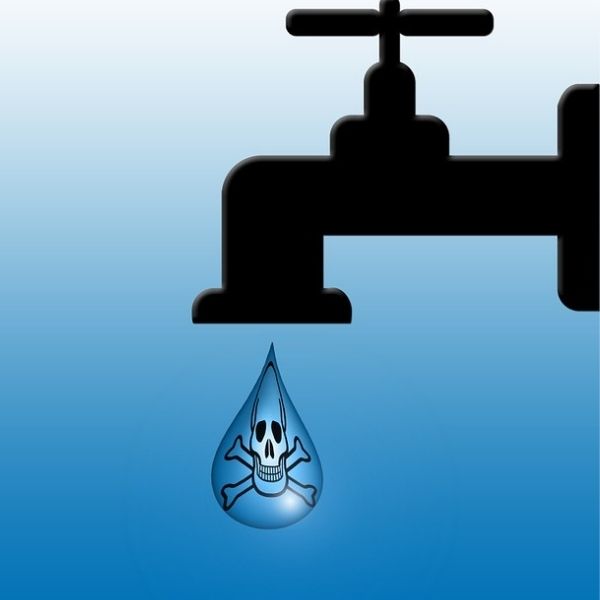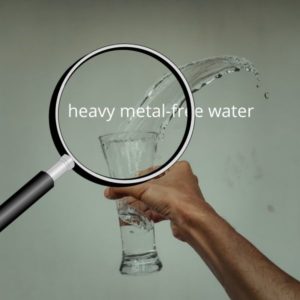3 Effective Ways of Heavy Metal Removal
There are various ways of removing metals, including complex chemical methods and a few conventional methods. Let’s dive deep into these.
Chemical Precipitation
You can add special chemical agents like sulfides and hydroxides to the contaminated water for the precipitation of heavy metals.
When added to water, they cause a strong attraction towards metals. Thus these metals break their bonds with water molecules to form bonds with added chemical agents.
Before adding chemical agents, the heavy metals are dissolved in drinking water altogether. But upon adding chemical agents, they form compounds that are not soluble anymore. They become insoluble and are precipitated.
Then the precipitated metals can be removed by various methods, including filtration. Other agents used to remove these metals are chelating agents like EDTA. The chelating agent removes toxic metals from water by forming complexes with them.
These complexes are separated from the water later like other pollutants. It is one of the low-cost methods of metal removal.

Ion Exchange
Ion exchange methods use the charge of the ions for heavy metal removal from water. An ion exchange system uses the resin that has ions bound to itself. These bound ions have a high affinity for these heavy metal ions. Thus, they cause the removal of these metals from water.
Water containing these ions is passed from the ion exchange system. The resin binds metals ions and releases its own ions. The ions released are relatively harmless.
Electro-Coagulation
Electrocoagulation is the best example of chemical engineering for the removal of heavy metals present in water. Sometimes, it is used along with chemical treatments to remove these metals and other contaminants for greater efficiency.
This method employs the use of metal electrodes of iron and aluminum. The anode is made of metal and produces metal ions. In contrast, cathode attracts hydroxide ions and generates hydrogen gas.
This gas starts bubbling up towards the surface, carrying the metals and additional contaminants along with it. At the same time, the metal from the anode forms flocs after reacting with hydroxide. It adsorbs organic compounds and traps particles.
Unlike other conventional water treatment methods, this method does not produce secondary pollutants. In order to make pure drinking water, you need to replace electrodes after regular intervals.
What Are Heavy Metals?
Heavy metals include a wide variety of metals with high molecular weights and densities. There is no single definition or criterion for heavy metals. But mostly, metals belonging to the d-block of the atomic table are considered heavy. So, the majority of these metals are transition metals.
Generally, these metals are hard, highly dense, high melting point, high tensile strength, and colored ones. They form complexes with other metals as well. Due to their properties, they are used in various fields.
Sources of Heavy Metals Contamination
Human activities are the leading cause of heavy metals contamination. The wastewater from households has so many chemicals and waste cosmetics with heavy metals.
Other sources include mining, foundries, smelting, and different industries dump wastewater into water bodies. The polluted water from dumping sites, landfills, and livestock manure leaks into groundwater, causing contamination.
Industries like leather, automobiles, cosmetics, and fertilizers cause abstract heavy metal contamination. These industries release chromium, lead, nickel, mercury, arsenic, and other heavy metals in the water. Nuclear power plants add the most hazardous heavy metal like cadmium to the water.
Symptoms and Dangers of Heavy Metals
The industrial boom has caused heavy metals pollution and their exposure to humans. These metals are needed in trace amounts, but they become poisonous when they enter the body in large quantities.
Metals like lead, mercury, and chromium do so much damage to our health, including kidney failure and nervous disorders.
These metals cause toxicity and poisoning in the body, which lead to serious health problems. Mercury exposure can lead to skin cancer and lesions. It may lead to muscle weakness, numbness of limbs, and muscular dystrophy.
When too much lead enters the body, it causes cardiovascular, nervous, and respiratory diseases. High molecular weight metals harm the animals and their health as well. They cause the death of fish annually.
Some of the metals undergo corrosion, thus damaging the material.
The symptoms of drinking water contaminated with heavy metals include nausea, diarrhea, headache, chills, shortness of breath, abdominal pain, and vomiting. This happens when the exposure to these metals is for a short time. But the long term exposure causes severe damage like organ failure and cancer.
Does Water Filter Eliminate Heavy metals?
Water filters can easily remove high molecular weight metals. Various types of water filters are efficient for the removal of metals. These filters include reverse osmosis water filters and granular activated carbon filters for removing these metals.
A significant fraction of heavy metal cannot pass through these filters. Thus, you can have safe and metals-free water in the end.
Which Water Filters Remove Heavy Metals?
Reverse Osmosis system
A reverse osmosis system uses membrane filtration to remove contaminants, including high molecular weight metals. These filtrations systems have a semi-permeable membrane that separates the impurities from polluted water. After passing through these filtration systems, the treated water is pure without impurities.
You need to install these filters based on RO membrane to have safe drinking water. The RO membrane system is present in different filters, from refrigerator filters to whole house filters. You can get one depending on your need.
Countertop Water Filters
Countertop water filter systems use conventional filtration methods to solve the severe problem of water contamination. They cause the removal of heavy metals and other severe contaminants and provide safe water in your kitchen. Due to their manageable size, they fit perfectly over the counter in your kitchen. They are low-cost filters, and their maintenance is so easy.
Despite their small size, they have high pressure for filtering water. The capacity for filtering water of these filters is also relatively high.

Granular Activated Carbon Filters
Granular carbon filters are super-efficient for heavy metal removal because of their adsorption properties. These filters use activated charcoal that is packed in a column. When water passes from this filter, the impurities in the water get adsorbed in the column packed with charcoal.
The impurities are visible on that activated carbon while water leaves pure. But you need to replace the filter actively after a particular time even though it replenishes itself after every cycle.
These filters have low cost and high efficiency as well as capacity. That is why they are the best for filtering water.
Backpacking Water Filters
Backpacking water filters come in handy when you are out for a picnic and need drinking water. The water sources are often polluted with heavy metals. So, you need to filter the water before using it. Backpacking water filters are small, low-cost water filters that use a reverse osmosis system.
They filter out the water by getting rid of impurities. They remove up to 96% of contaminants, including heavy metals. As they are portable, you can take them wherever you want to filter water at the spot.
FAQs on How to Remove Heavy Metals From Water?
How do I know if my house is contaminated with heavy metals?
Start noticing the smell and taste of the water. If there is a bitter taste and pungent aroma, the water is contaminated with heavy metals. You will even start experiencing the signs of poisoning like vomiting and stomach aches. To confirm the suspicion of contamination, test your water from a local laboratory.
Does boiling water eliminate heavy metals?
Unfortunately no! Boiling water does not affect heavy metals. It does not remove them from water, even at high temperatures. It may lower the number of metals but fails to eliminate them.
Does ZeroWater remove heavy metals?
Yes! Zero Water filter has superiority over other filters for removal of heavy metals from the water. This ability is because of its deionizing capability, which leaves all the metals without charges. Thus you get metal-free pure water.
Conclusion
We hope that all the methods and filters compiled here will prove helpful for you. This is because the presence of heavy metals in water harms human health and the materials of the pipes as well.
The threat that it poses calls for its immediate removal from the water. We have provided all the information you need to know to get the water free of heavy metals. If you have any queries or feedback regarding these methods, please leave a comment below to bring them to our knowledge.
